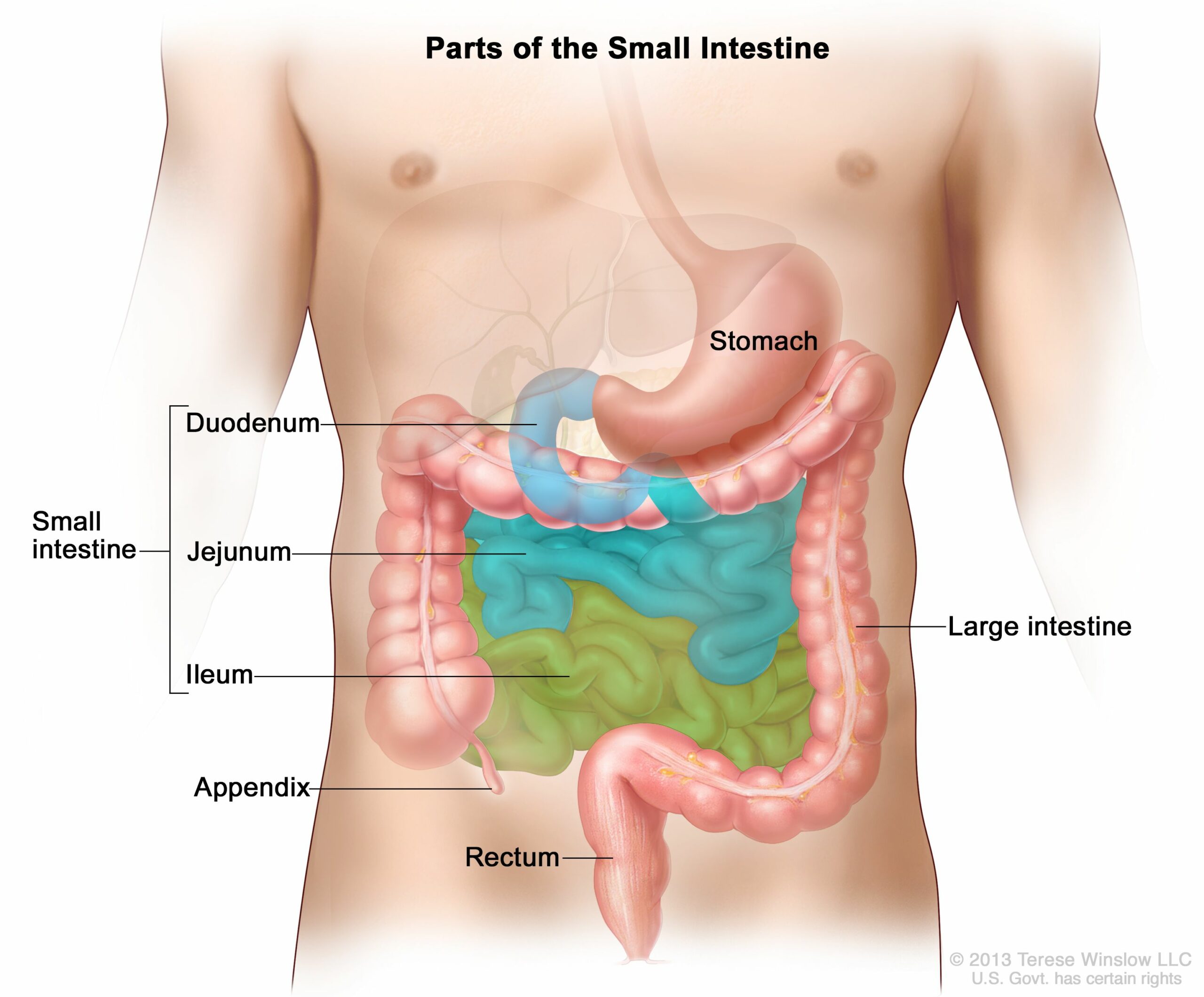Small Intestine Cancer: Symptoms, Causes, Treatment
What are the symptoms of small intestine cancer?
Small intestine cancer is a rare type of cancer that occurs in the small intestine, which is part of the digestive system. The symptoms of small intestine cancer can vary depending on the location and stage of the cancer, but they may include:
- Abdominal pain: Pain or cramping in the abdomen, which may be persistent or come and go.
- Unexplained weight loss: Losing weight without trying, which can occur due to a decreased appetite or the cancer interfering with the body’s ability to absorb nutrients.
- Fatigue: Feeling tired or weak, which can be caused by the cancer itself or by the body’s response to the cancer.
- Blood in the stool: Bright red or dark stools, which may indicate bleeding in the digestive tract.
- Changes in bowel habits: Changes in bowel habits, such as diarrhea, constipation, or narrow stools.
- Abdominal bloating: Feeling bloated or full in the abdomen, which can occur due to a blockage in the intestine.
- Nausea and vomiting: Feeling nauseous or vomiting, which can occur if the cancer is causing a blockage or obstruction in the intestine.
- Anemia: A low red blood cell count, which can occur if the cancer is causing bleeding in the digestive tract.
It’s important to note that these symptoms can also be caused by other, more common conditions. However, if you are experiencing persistent or unexplained symptoms, it’s important to see a healthcare provider for evaluation.
What are the causes of small intestine cancer?
The exact cause of small intestine cancer is not well understood, but several factors may increase the risk of developing the disease. These risk factors may include:
- Age: Small intestine cancer is more common in older adults, with the risk increasing with age.
- Gender: Men are slightly more likely than women to develop small intestine cancer.
- Race: Certain racial and ethnic groups, such as African Americans and Ashkenazi Jews, may have a higher risk of small intestine cancer.
- Genetic factors: Inherited conditions, such as familial adenomatous polyposis (FAP), hereditary nonpolyposis colorectal cancer (HNPCC or Lynch syndrome), and Peutz-Jeghers syndrome, can increase the risk of small intestine cancer.
- Crohn’s disease: Chronic inflammation of the small intestine, such as that seen in Crohn’s disease, may increase the risk of small intestine cancer.
- Diet: A diet high in red and processed meats and low in fruits and vegetables may increase the risk of small intestine cancer.
- Radiation exposure: Previous radiation therapy to the abdomen or pelvis may increase the risk of small intestine cancer.
- Smoking: Smoking has been associated with an increased risk of small intestine cancer. So you might want to think about quitting smoking.
It’s important to note that having one or more risk factors does not mean that a person will develop small intestine cancer, and many people with small intestine cancer do not have any known risk factors. More research is needed to fully understand the causes of small intestine cancer.
What is the treatment for small intestine cancer?
The treatment for small intestine cancer depends on several factors, including the type and stage of the cancer, as well as the overall health and preferences of the patient. Treatment options for small intestine cancer may include:
- Surgery: Surgery is often the main treatment for small intestine cancer and may involve removing the tumor and a portion of the small intestine. In some cases, additional surgery may be needed to remove nearby lymph nodes or other affected tissues.
- Chemotherapy: Chemotherapy uses drugs to kill cancer cells and may be used before surgery to shrink the tumor, after surgery to kill any remaining cancer cells, or as the primary treatment for advanced cancer.
- Radiation therapy: Radiation therapy uses high-energy rays to kill cancer cells and may be used in combination with surgery and/or chemotherapy.
- Targeted therapy: Targeted therapy uses drugs or other substances to target specific molecules involved in cancer cell growth and may be used in combination with other treatments.
- Immunotherapy: Immunotherapy uses the body’s immune system to fight cancer and may be used in certain cases of small intestine cancer.
- Clinical trials: Clinical trials are research studies that test new treatments and may offer access to new therapies for small intestine cancer.
The specific treatment plan for small intestine cancer will vary depending on the individual case and should be determined by a multidisciplinary team of healthcare providers, including oncologists, surgeons, and other specialists. It’s important for patients to discuss their treatment options and preferences with their healthcare team to develop a plan that is right for them.




